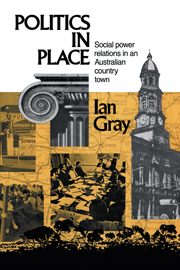Book contents
- Frontmatter
- Contents
- List of figures, maps
- 1 Introduction: the origins of a study
- 2 Power: concepts and applications
- 3 A history of Cowra
- 4 Elitism and local government
- 5 Spatial politics
- 6 The politics of development
- 7 Gender, race and human services
- 8 The making of local politics
- 9 Ideologies and resources
- 10 Conclusion: the machinery of power
- Epilogue
- Acknowledgements
- Appendix
- Bibliography
- Index
5 - Spatial politics
Published online by Cambridge University Press: 08 October 2009
- Frontmatter
- Contents
- List of figures, maps
- 1 Introduction: the origins of a study
- 2 Power: concepts and applications
- 3 A history of Cowra
- 4 Elitism and local government
- 5 Spatial politics
- 6 The politics of development
- 7 Gender, race and human services
- 8 The making of local politics
- 9 Ideologies and resources
- 10 Conclusion: the machinery of power
- Epilogue
- Acknowledgements
- Appendix
- Bibliography
- Index
Summary
Power can only accrue to those who have sufficient resources to turn their concerns into issues, unless their concerns correspond to what is determined in the political arena to be appropriate matters for its attention. In that situation, under pluralist assumptions, competing interests are balanced. The ‘people's corporation’ image of local government, however, suggests contrarily that everybody's concerns are the council's concerns; there is, therefore, no need for pluralism and no need for political action. Yet from time to time people do act. They may, however, be deflected from pursuit of their interests in the second stage, or ignored in the third stage of Saunders' three-stage non-decision making filter (1979).
This does not require conscious direction from one or a few individuals, as Wild (1974a) found to occur in Bradstow. Wild observed that Bradstow's Town Clerk had three obviously intentional tactics for agenda setting: simply leaving potentially threatening or controversial matters off Council agendas, putting matters before the Council in such a way that the aldermen interpreted his wishes as the most desirable course of action, and keeping matters which might embarrass the Council off the agenda to protect his own legitimacy. Wild offered an example of a town planning decision, made as the Clerk wished after he had misrepresented a planning proposal as something which the aldermen would not desire. His knowledge of their values enabled him to use those values as a resource, in order to ensure that the aldermen would make the decision he wanted. In this activity the Town Clerk worked in concert with the Mayor, but such conspiracy is not necessary for identification of power relations enacted through agenda setting.
- Type
- Chapter
- Information
- Politics in PlaceSocial Power Relations in an Australian Country Town, pp. 62 - 87Publisher: Cambridge University PressPrint publication year: 1992



